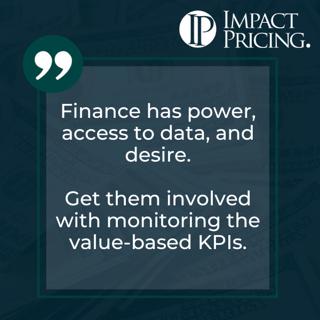
Pricing Table Topics: 2 of Diamonds – Involve Finance with Monitoring the Value-based KPIs.
This one is the 2 of Diamonds from the Selling Value card deck. I'm often asked who should own pricing, and one of the departments that often comes up is finance. And of course, I'm not a huge fan of finance owning pricing. And the biggest reason is finance doesn't truly understand the value of our products. Usually that's going to be someone in product management, product marketing, or even sales, which I'm not a fan of them owning pricing either. However, finance so much wants to be involved with pricing. It's so crucial to their projections. It's so crucial to company growth, which they care a lot about. They really want to be involved with pricing, even though they don't understand value. So, how do we get them involved in pricing? That's pretty simple. Finance has a bunch of quant people. They have access to every piece of data inside the entire company, and they have the desire to make us or help us do better in our pricing. And so, let's figure out what are the KPIs, the key performance indicators, that we really want to track inside our company. And let's ask finance to help track those, keep us on track, make sure that we don't see any anomalies. We know what the trends are. Finance is a fantastic department to help us manage our KPIs. We hope you enjoyed this example of Pricing Table Topics. What you just heard was done without a script. If you want to get better at speaking about pricing and value, grab a deck of our cards, pick a card, read the saying, and then talk for one to two minutes about what that card says. You'll become a better speaker and expert. If you have any questions or feedback, please email me, mark@impactpricing.com. Now, go make an impact. Connect with Mark Stiving: Email: mark@impactpricing.com LinkedIn: https://www.linkedin.com/in/stiving/
23 Aug 20232min
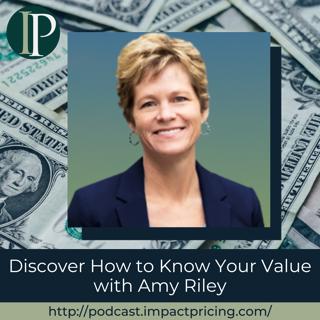
Discover How to Know Your Value with Amy Riley
Amy L. Riley is an internationally renowned speaker, author and leadership development consultant. She's worked with organizations such as Deloitte, Cisco Systems and Aon Hewitt and has over 20 years of experience working with leaders at all levels. In this episode, Amy shares effective ways of identifying your strengths, finding solutions to people's problems, and quantifying the results of your solutions. By doing so, you can accurately assess your ability to bring about transformation for your clients and determine your true worth. What you will learn from this episode: Learn to know your strength and what value you bring so you know your worth Discover the benefits of receiving feedback to identify areas for improvement and areas to maintain to enhance your leadership skills Find out how to develop people skills so you become a more effective leader "Encourage leaders to get feedback all the time." - Amy Riley Topics Covered: 00:57 - What Amy is helping people with 02:09 - The value you bring--what's your worth? 04:22 - Best means to identify your strengths 06:49 - How does feedback benefit you as a leader and how to deal with self-delusion? 09:49 - Figure out your leadership legacy 10:52 - Fighting to be right versus fighting to be effective 11:49 - The thing with leaders admitting their mistakes 12:43 - What is a pivot and why pivot? 13:35 - The easy ways to find out where your strengths lie 14:50 - How to develop effective people skills 17:42 - Why the need to be open to feedback 20:00 - Amy sharing what her strengths and what problems she helps solve 24:22 -The potential outcome and its financial value that can be attained with Amy's expertise Key Takeaways: "The value that we bring is inherent in our strengths." - Amy Riley "When we're looking to that leadership legacy for guidance, then we act bigger and bolder than any of our normal human considerations that might hold us back." - Amy Riley "If you do find yourself in those moments where you're fighting to be right instead of fighting to be effective, do give yourself some compassion, because we're human beings, and that's a human tendency." - Amy Riley People/Resources Mentioned: The Courage of a Leader®: How to Inspire, Engage and Get Extraordinary Results by Amy Riley: https://courageofaleader.com/products/ Connect with Amy Riley: Website: https://courageofaleader.com/ LinkedIn: https://www.linkedin.com/in/amyshoopriley/ Connect with Mark Stiving: LinkedIn: https://www.linkedin.com/in/stiving/ Email: mark@impactpricing.com
21 Aug 202327min
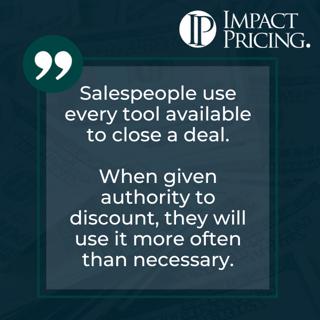
Pricing Table Topics: 2 of Clubs – Salespeople with Authority to Discount
This one is the 2 of Clubs from the Selling Value card deck. Salespeople are going to use every single tool they have available to them. Absolutely, they're going to use value selling if we've taught them how, and they understand, and they're doing a great job. But even if they're using value selling, it's very easy for them to offer discounts. And there's this attitude or belief that offering discounts helps close a deal faster. And maybe it does. Maybe when a customer or a buyer asks you for a discount, it takes longer to say no and explain why. And we could have just said yes and close the deal and we're done. Wouldn't that be great if it worked that way? But here's the key. Every dollar that we discount comes straight off of our profit. We still have to cover all of our costs, and so our margin just got shrunk by more than our revenue did on a percentage basis. So, if we want our salespeople to not rely on price, we have to make it painful for salespeople to offer discounts. How do you do that? Create a compensation plan that as they give bigger discounts, the percentage or the size of their deal goes down faster than the revenue goes down because salespeople are incentivized to close deals as fast as possible. And we want to make sure they're incentivized to close deals quickly at the highest possible price. We hope you enjoyed this example of Pricing Table Topics. What you just heard was done without a script. If you want to get better at speaking about pricing and value, grab a deck of our cards, pick a card, read the saying, and then talk for one to two minutes about what that card says. You'll become a better speaker and expert. If you have any questions or feedback, please email me, mark@impactpricing.com. Now, go make an impact. Connect with Mark Stiving: Email: mark@impactpricing.com LinkedIn: https://www.linkedin.com/in/stiving/
18 Aug 20232min

Pricing Table Topics: 2 of Hearts – The Best Response to an RFP Is Not to Bid
This one is the 2 of Hearts from the Selling Value card deck. When you get an RFP, you have to decide, are you going to bid or not. Believe it or not, that's actually a decision you get to make. You do not have to respond to every RFP that comes through. And my advice, if you are not involved in the creation of the RFP, or at the very least, if you cannot have conversations with the decision makers or executives of the group who created that RFP, you have a very low chance of winning. And so, the time and energy that you spend replying to the RFP makes you feel like you're doing work, but odds are really good you're not going to win that deal. There's somebody else that has already built a relationship with the client, understands exactly what the client wants, is able to create a response to that RFP that fits them almost perfectly. They've built the rapport so the client's going to give them the benefit of the doubt no matter what. If you're going in blind to an RFP, you're probably not going to win. Let's test that. From here on out, every time you respond to an RFP, just keep track. Did I help write this? Do I know the leaders? Do I get conversations with the executives? And if the answers are no, and you go ahead and bid, see how many of those you actually win. And I will bet you the percentage of those is so low you realize it just isn't worth your time to bid RFPs where you're not already involved. We hope you enjoyed this example of Pricing Table Topics. What you just heard was done without a script. If you want to get better at speaking about pricing and value, grab a deck of our cards, pick a card, read the saying, and then talk for one to two minutes about what that card says. You'll become a better speaker and expert. If you have any questions or feedback, please email me, mark@impactpricing.com. Now, go make an impact. Connect with Mark Stiving: Email: mark@impactpricing.com LinkedIn: https://www.linkedin.com/in/stiving/
16 Aug 20232min

Challenges of Pricing AI with Steven Forth
Steven Forth is Ibbaka's Co-Founder, CEO, and Partner. Ibbaka is a strategic pricing advisory firm. He was CEO of LeveragePoint Innovations Inc., a SaaS business designed to help companies create and capture value. In this episode, Steven discusses the challenges of pricing AI, primarily due to the limited availability of data. He emphasizes the importance of shortening the time required to build value models in order to easily establish pricing. What you will learn from this episode: Discover the complaints and challenges associated with pricing AI Enhance transparency in establishing the price point with creating value models Find out the most recent advancements in AI pricing concerning language models and software, which greatly enhance productivity "Once you have a good value model, coming up with pricing is maybe not trivial but it's certainly much easier." - Steven Forth Topics Covered: 01:15 - Discussing complaints about AI through the Value Models 07:57 - Steven's added thoughts to Mark's suggested solution to achieve pricing transparency [limitations in creating value models] 11:43 - The need for more trainings for language models used in pricing 14:25 - What is Copilot by Microsoft and what it is capable of doing that can help salespeople 17:04 - How is Copilot might disrupt the market especially Google Workspace user 17:50 - Survey of people's willingness to pay $30 a user for Copilot [and whose group is more willing to pay more] 22:20 - How were the users segmented, are they all Copilot users, and finding out people's reaction to AI 23:37 - The amazing capabilities of these two AIs 24:57 - What could happen if Mark Stiving will use AI to write his fourth book [The need for great prompt engineering] 28:12 - How are AIs going to be priced 29:59 - Microsoft Copilot as a 'Will I' question Key Takeaways: "If you can build a value model and validate a value model, then you can fairly easily, I believe, derive pricing from the value model." - Steven Forth "We should be able to customize a language model based on our training and integrate mathematical AI from a place such as Wolfram/Alpha to greatly scale up our ability to build value models so that we could legitimately do a thousand a year or so." - Steven Forth Resources/People Mentioned: Craig Zawada: https://impactpricing.com/podcast/ep95-defining-no-touch-and-self-serve-pricing-with-craig-zawada/ PROS: https://pros.com/ Vendavo: https://www.vendavo.com/ Zilliant: https://www.zilliant.com/ McKinsey: https://www.mckinsey.com/ Wolfram/Alpha: https://www.wolframalpha.com/ iGenius: https://www.igenius.ai/ Hugging Face: https://huggingface.co/ OpenAI: https://openai.com/ Figma: https://www.figma.com/ Notion: https://www.notion.so/product Connect with Steven Forth: Email: steven@ibbaka.com LinkedIn: https://www.linkedin.com/in/stevenforth/ Connect with Mark Stiving: LinkedIn: https://www.linkedin.com/in/stiving/ Email: mark@impactpricing.com
14 Aug 202332min

Blogcast: Next Book Title?
This is an Impact Pricing Blog published on July 6, 2023, turned into an audio podcast so you can listen on the go. Read Full Article Here: https://impactpricing.com/blog/next-book-title/ If you have any feedback, definitely send it. You can reach us at mark@impactpricing.com. Now, go make an impact. Connect with Mark Stiving: Email: mark@impactpricing.com LinkedIn: https://www.linkedin.com/in/stiving/
11 Aug 20232min
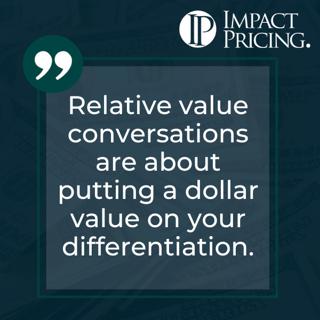
Pricing Table Topics: 2 of Spades – Relative Value Conversations
This one is the 2 of Spades from the Selling Value card deck. You've heard me talk about value conversations before, where value conversations are really the conversation we have with a customer or potential buyer, so they can determine how much additional profit they're going to make when they use your product. And that's awesome when they're only making a 'Will I' decision. Am I going to buy your product or not? Am I going to buy a product in your category or not? But what happens when they say, "Am I going to buy your product or somebody else's product?" Now what we want to do is understand our differentiation because value in that case comes from the price of our competitor's product plus the value of our differentiation. We need to determine the value of our differentiation. Or said better, we need our customers or buyers to determine the value of our differentiation. And that's what a relative value conversation is. We want to see what's our differentiation relative to our competitors, and then go through the exact same steps we would with a normal value conversation to help the buyer determine if you have this problem that this differentiator solves, what's the result you might expect? How much additional value do you think you would get? And now we're putting a dollar value on the differentiation. This is powerful when you're competing. We hope you enjoyed this example of Pricing Table Topics. What you just heard was done without a script. If you want to get better at speaking about pricing and value, grab a deck of our cards, pick a card, read the saying, and then talk for one to two minutes about what that card says. You'll become a better speaker and expert. If you have any questions or feedback, please email me, mark@impactpricing.com. Now, go make an impact. Connect with Mark Stiving: Email: mark@impactpricing.com LinkedIn: https://www.linkedin.com/in/stiving/
9 Aug 20232min
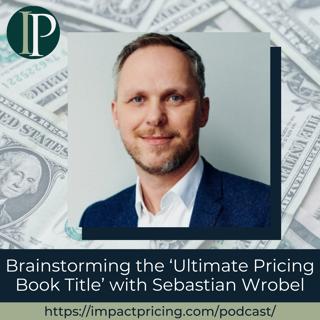
Brainstorming the 'Ultimate Pricing Book Title' with Sebastian Wrobel
Sebastian Wrobel is an energetic and passionate professional leader, helping companies achieve value and pricing excellence. Pushing digital transformation into lasting integration. Experienced in working closely with the C-suite and senior stakeholders to elaborate and drive major profit & growth optimisation plans. Building high performing teams by leveraging a collaborative and data driven leadership approach. In this episode, Sebastian provides valuable insights on how to create the perfect title for a pricing book. The goal of which is to capture the attention of individuals driving pricing within a company. What you will learn from this episode: Understand the discovery process of value generation to come up with best pricing strategies Gain a deep understanding about value and pricing as Mark and Sebastian carefully examine various book titles on the subject Understand the discovery process around value and pricing "Start your [pricing] journey wherever you are, and accelerate on your journey wherever you are. The investment is paying off, always." - Sebastian Wrobel Topics Covered: 01:17 - A quick fun story on how he got lost for two days in the mountains 01:55 - What got him into pricing? 03:02 - Valugram as a company -- what it does 07:30 - What most companies are missing out on in regard to value and pricing 08:04 - Understanding the 'discovery process' 11:06 - Thoughts on value and pricing as understood by experts in their own fields 13:31 - Gaining business confidence 15:59 - Challenging the idea behind this title for a book: The Secret to Skyrocketing Profit 18:45 - Feedback on this title - Leveraging Value: CEO's Blueprint for Driving Profits 22:40 - Will addressing CEOs in the book title encapsulates all other people who are driving pricing other than the CEOs? 24:53 - An analysis of the title - The Power of Value: The CEO's Secret Weapon to Driving Profits 30:57 - Sebastian's pricing advice 31:25 - How to connect with Sebastian Key Takeaways: "Value selling is not applicable to all products. Neither all client segments. Where it is applicable, you should do it properly." - Sebastian Wrobel "Gartner study shared that this is the critical aspect about winning deals, enabling buyers to make a decision in the right one." - Sebastian Wrobel "As pricing people, we tend to think in profits. But for me, leveraging value is more. Not only profit, but it's about driving revenue, top line growth, and also customer loyalty." - Sebastian Wrobel Connect with Sebastian Wrobel: LinkedIn: https://www.linkedin.com/in/sebastian-w/ Website: https://pricingworks.io/ Website: https://www.valugram.com/ Connect with Mark Stiving: LinkedIn: https://www.linkedin.com/in/stiving/ Email: mark@impactpricing.com
7 Aug 202332min






















